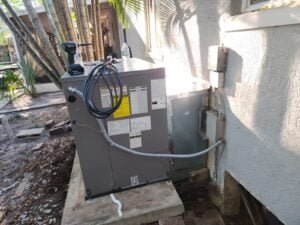What Are BTUs?
In the world of home heating, cooling, and overall comfort, understanding the concept of a British Thermal Unit (BTU) is crucial. This seemingly small unit plays a gigantic role in ensuring that your home’s environment is just the way you like it. Whether you’re considering a new air conditioning system, pondering over heating options, or simply curious about how your home maintains its cozy atmosphere, this comprehensive guide will illuminate the importance of BTUs in residential and light commercial HVAC systems.
Introduction to BTUs
What Exactly is a BTU? A British Thermal Unit, or BTU, is a unit of heat; it is the amount of energy needed to raise the temperature of one pound of water by one degree Fahrenheit. While this might sound technical, it’s a basic measure used to define the power of heating and cooling systems. In simpler terms, the higher the BTU rating of an appliance, the more powerful it is.
Why BTUs Matter in Your Home
BTUs, or British Thermal Units, are a key factor in the heating and cooling of your home, especially in a climate like Tampa Bay’s. Understanding BTUs is crucial for several reasons:
- Sizing Your AC Unit: The number of BTUs is a measure of how much heat an air conditioning unit can remove from a room per hour. In your area, where temperatures can get quite high, having an AC unit with the right BTU rating is essential for effective cooling. An undersized unit won’t cool efficiently, while an oversized unit can lead to increased humidity and energy waste.
- Energy Efficiency: Knowing the BTU requirements for your space can help you choose an energy-efficient model. This is not only good for the environment but can also save on electricity bills. An AC unit with the appropriate BTU rating for your space will operate more efficiently than one that’s too large or too small.
- Comfort: The right BTU rating ensures that your AC unit can maintain a comfortable temperature in your home or office. This is particularly important in areas like Tampa Bay, where the heat and humidity can be intense.
- Cost-Effectiveness: Selecting an AC unit with the correct BTU rating for your space can be more cost-effective in the long run. It reduces wear and tear on the unit and avoids the extra costs associated with overcooling or continuous running of an underpowered unit.
- Maintenance and Longevity: Properly sized AC units tend to have a longer lifespan and require less maintenance. This is because they don’t have to work as hard to cool the space, reducing the strain on their components.

BTUs in Air Conditioning Systems
Calculating the Right Size When it comes to air conditioning, BTUs measure the amount of heat an AC unit can remove from a room per hour. The size of your room dictates the number of BTUs required. For instance, a small room may require an AC unit with a capacity of 5,000 BTUs, while a larger space might need 20,000 BTUs or more.
To determine the appropriate BTU rating for an air conditioner in a particular room, you need to consider several factors:
- Room Size: The basic rule of thumb is that an air conditioner needs 20 BTUs for each square foot of living space. However, this can vary based on ceiling height and room layout.
- Sun Exposure: Rooms that receive a lot of sunlight will need a higher BTU rating. If the room is heavily shaded, you can reduce the BTU capacity by 10%.
- Room Occupancy: More people means more heat. If more than two people regularly occupy the room, add 600 BTUs for each additional person.
- Other Heat Sources: If the room contains heat-generating appliances, or if the room is a kitchen, increase the capacity by 4,000 BTUs.
- Geographical Location: Areas with higher average temperatures, like Tampa Bay, may require air conditioners with higher BTU ratings for the same size room compared to cooler regions.
Example Calculation
Let’s consider a standard 12×15-foot room in Tampa Bay, which is 180 square feet. Using the basic calculation (180 sq ft x 20 BTUs), you’d start with 3,600 BTUs. If the room is sunny, add 10%, bringing it to 3,960 BTUs. If it regularly has three people in it, add another 600 BTUs, totaling 4,560 BTUs. This is a simplified example, but it illustrates the basic process.
BTUs in Heating Systems
In heating systems, British Thermal Units (BTUs) serve as a key metric for measuring heating efficiency and capacity. Understanding BTUs in this context is crucial for selecting the right heating system for your space, ensuring comfort, and optimizing energy use.
How BTUs Apply to Heating
- Definition: In heating, one BTU is the amount of energy needed to raise the temperature of one pound of water by one degree Fahrenheit.
- Heating Capacity: The BTU rating in heating systems indicates how much heat the unit can produce in an hour. The higher the BTU rating, the greater its heating capacity.
Types of Heating Systems and BTUs
Different heating systems use BTUs in various ways, depending on their design and function. Here are some common types:
- Furnaces: Furnaces, which can be powered by gas, electricity, or oil, use BTUs to measure their output capacity. A higher BTU rating means more heat output, suitable for larger spaces.
- Heat Pumps: Heat pumps are often rated in BTUs, similar to air conditioners. They provide both heating and cooling and are valued for their efficiency. The BTU rating for heat pumps indicates their heating efficiency in colder months and cooling capacity in warmer months.
- Boilers: Boilers, which can be used for heating air or water, also have BTU ratings. A higher BTU rating in a boiler indicates a higher capacity to heat larger volumes of water or larger spaces.
- Radiant Heating Systems: While BTU ratings are less commonly discussed with radiant heating systems, they are still relevant. These systems, which include underfloor heating, use BTUs to measure the heat output of the system.
- Space Heaters: Portable or fixed space heaters also have BTU ratings. These are typically lower than whole-home systems, as they are designed for heating smaller areas.
- Fireplaces and Wood Stoves: Even traditional heating methods like fireplaces and wood stoves have BTU ratings. These ratings help in understanding the amount of heat they can generate and the size of the space they can effectively heat.
Considerations for BTU in Heating Systems
- Efficiency: Higher BTU doesn’t always mean better. Efficiency is key. An oversized unit may waste energy, while an undersized one may not provide adequate warmth.
- Insulation and Heat Loss: Good insulation significantly affects the BTU requirement. Poorly insulated spaces may require heating systems with higher BTU ratings.
- Climate and Location: In colder climates, higher BTU ratings are often necessary to achieve the same level of warmth as in milder climates.

BTUs and Energy Efficiency
Understanding Efficiency Ratings:
- SEER Ratings: The Seasonal Energy Efficiency Ratio (SEER) is a key metric for air conditioners. It measures the cooling output during a typical cooling season divided by the total electric energy input during the same period. The higher the SEER rating, the more energy-efficient the unit is. This is particularly important in areas with hot climates like Tampa Bay, where air conditioners are used extensively.
- EER Ratings: The Energy Efficiency Ratio (EER) is another way to gauge an AC unit’s efficiency, calculated by dividing the BTU rating by the power (in watts) used. Unlike SEER, EER is calculated under specific conditions and offers a snapshot of efficiency at peak operating times.
- HSPF Ratings for Heat Pumps: The Heating Seasonal Performance Factor (HSPF) is used for measuring the efficiency of heat pumps. It’s calculated by dividing the total heating required (in BTUs) by the electricity used (in watts) during the season. A higher HSPF rating indicates greater efficiency.
Balancing BTUs and Efficiency:
- Right Sizing: The first step is to ensure that the HVAC system is correctly sized for the space it needs to cool or heat. An oversized unit can cause short cycling, leading to inefficiency and wear, while an undersized unit will struggle to maintain comfortable temperatures, using more energy in the process.
- Climate Consideration: In Tampa Bay, the focus is often more on cooling efficiency due to the hot and humid climate. A high SEER rating is desirable for air conditioners. However, for heating services, the efficiency of furnaces or heat pumps (measured by AFUE or HSPF) is also important.
- Cost vs. Efficiency: Higher efficiency units typically cost more upfront but can offer significant savings in energy costs over time. It’s important to calculate the long-term savings in energy bills when considering a higher SEER/EER/HSPF unit.
- Maintenance and Efficiency: Regular maintenance, like the Therapy Maintenance Plans offered by The AC Therapist, can help maintain the efficiency of the unit. This includes cleaning, checking for leaks, ensuring the refrigerant levels are correct, and inspecting the electrical components.
- Advanced Features: Modern units often come with features like variable-speed blowers and smart thermostats that can significantly improve efficiency. Smart thermostats, for instance, can optimize the HVAC operation based on your habits and preferences, leading to energy savings.
For The AC Therapist, understanding and effectively communicating these aspects to customers is vital. It helps in guiding them to make informed decisions about their HVAC systems, balancing the initial investment against long-term energy savings and efficiency. This knowledge is also crucial for recommending the right products and services, ensuring that the solutions provided are not only effective in terms of climate control but also cost-effective and energy-efficient in the long run.

Practical Considerations for Homeowners
Assessing Your Home’s Needs Before selecting an HVAC system, consider having a professional assessment of your home. This evaluation should account for factors like square footage, climate, insulation, and window size to determine the appropriate BTU capacity.
Maintenance and BTUs Regular maintenance, such as duct cleaning, filter changes, and system checks, can help maintain the efficiency of your HVAC system, ensuring it operates at the right BTU level for your home.
Advanced BTU Considerations
Advanced considerations regarding BTUs, particularly in the context of multi-zone mini-split systems and smart thermostats, are crucial for optimizing home comfort and energy efficiency.
Multi-Zone Mini Split Systems:
- Individualized Comfort: Multi-zone mini-split systems allow for different BTU ratings in each zone or room, catering to the specific cooling or heating needs of that area. This is especially beneficial in homes where different family members have varying temperature preferences.
- Efficient BTU Utilization: By allowing different areas to be heated or cooled independently, you can avoid wasting energy on unoccupied spaces. This means you can use a higher BTU unit in larger or more frequently used areas and lower BTU units in smaller or less used spaces.
- Installation Considerations: When installing multi-zone systems, it’s important to accurately calculate the BTU requirements for each zone. This involves considering factors like room size, window sizes, insulation quality, and typical occupancy.
- Scalability: One of the advantages of multi-zone systems is scalability. You can start with what you need and expand later, adding more units or zones as necessary. This can be a cost-effective approach to home comfort.
Smart Thermostats:
- Optimized BTU Usage: Smart thermostats can significantly enhance the efficiency of your HVAC system. They learn your preferences and schedule, adjusting the temperature accordingly. This means the system uses the necessary BTUs more effectively, providing comfort only when needed.
- Remote Control and Monitoring: Homeowners can adjust settings remotely, ensuring that the system isn’t using unnecessary BTUs when no one is home. This can lead to significant energy savings.
- Data Insights: Many smart thermostats provide detailed data on your energy usage, helping you understand when and where you’re using the most energy for heating and cooling. This can guide you to make adjustments that save BTUs and reduce costs.
- Integration with Multi-Zone Systems: Smart thermostats can be particularly effective when integrated with multi-zone systems. They can control different zones independently, optimizing the BTU usage throughout the home based on real-time needs.
The future of BTUs in HVAC system technology
The future of BTUs in HVAC system technology is shaping up to be quite innovative, with advancements focusing on increased efficiency, sustainability, and integration with smart home technology. Here’s a glimpse into what the future might hold:
- Higher Efficiency Systems: Future HVAC systems are expected to be even more energy-efficient. This means they will provide the same or better cooling and heating using fewer BTUs, reducing energy consumption and lowering utility bills. Advancements in compressor technology, fan motors, and heat exchange materials will play a significant role in this.
- Smart and Automated Systems: The integration of HVAC systems with smart home technology is expected to become more sophisticated. Systems will not only respond to manual settings on smart thermostats but also to data from other smart devices, optimizing BTU usage based on real-time environmental data and user behavior patterns.
- Renewable Energy Integration: As the focus on sustainability grows, future HVAC systems will likely be designed to integrate more seamlessly with renewable energy sources like solar and wind power. This could involve systems that are capable of operating at variable power inputs while maintaining efficient BTU usage.
- Eco-Friendly Refrigerants: The HVAC industry is moving towards the use of refrigerants that have a lower global warming potential (GWP). Future systems will be designed to work efficiently with these new refrigerants, reducing the environmental impact without compromising on the BTU output necessary for effective heating and cooling.
- Variable Speed Technology: The use of variable speed compressors and fans allows the system to adjust its BTU output precisely to the needs of the moment, rather than cycling on and off. This not only improves efficiency but also extends the life of the system and provides better comfort control.
- Personalized Comfort Solutions: Future systems might use advanced algorithms and AI to provide personalized comfort settings, learning from user preferences and adjusting BTU output for optimal comfort and efficiency.
- Advanced Air Quality Features: With a growing emphasis on indoor air quality, future HVAC systems may incorporate more advanced air purification and monitoring technologies, using optimal BTU usage to ensure a healthy indoor environment.
- Geothermal Systems: These systems, which use the earth’s stable temperature for heating and cooling, might become more mainstream. They are highly efficient in BTU usage and are sustainable, but currently, they come with high installation costs.

Understanding BTUs: Your Key to Comfort and Efficiency with The AC Therapist
In conclusion, understanding what a BTU (British Thermal Unit) is and its significance in the realm of heating, ventilation, and air conditioning (HVAC) is crucial for any homeowner, particularly in regions like Tampa Bay where extreme temperatures can affect comfort and energy consumption. A BTU is the basic measure used to denote the amount of energy needed to heat or cool one pound of water by one degree Fahrenheit. In the context of your home, it directly relates to the capacity and efficiency of your HVAC system.
Choosing the right HVAC system, with the appropriate BTU rating for your space, is essential for maintaining a comfortable, energy-efficient home. Whether you’re looking to install a new system, maintain an existing one, or seek advice on energy-efficient HVAC solutions, The AC Therapist is your go-to expert in the Tampa Bay area. With a comprehensive range of services including AC repair, installation, maintenance, and more, The AC Therapist is dedicated to ensuring your living or working environment remains comfortable all year round.
Remember, the right BTU capacity for your HVAC system can make a significant difference in your comfort, energy bills, and the longevity of the system itself. For professional guidance and top-notch service, consider reaching out to The AC Therapist. They’re not just experts in the field; they’re your ally in navigating the complexities of HVAC systems and ensuring that your indoor climate is exactly as you need it to be.








